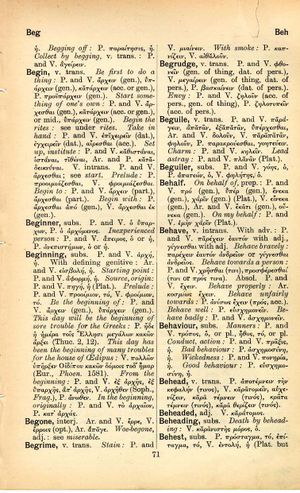beginning
μισῶ σοφιστὴν ὅστις οὐχ αὑτῷ σοφός → I hate the sage who recks not his own rede, I hate the sage who is not wise for himself, I hate the wise man who is not wise on his own
English > Greek (Woodhouse)
subs.
P. and V. αρχή, ἡ.
With defining genitive: Ar. and V. εἰσβολή, ἡ.
Starting point: P. and V. ἀφορμή. ἡ.
Source, origin: P. and V. πηγή, ἡ (Plat.).
Prelude: P. and V. προοίμιον, τό, V. φροίμιον. τό.
Be the beginning of: P. and V. ἄρχειν (gen.), ὑπάρχειν (gen.).
This day will be the beginning of sore trouble for the Greeks: P. ἥδε ἡ ἡμέρα τοῖς Ἕλλησι μεγάλων κακῶν ἄρξει (Thuc. 2, 12).
This day has been the beginning of many troubles for the house of Œdipus: V. πολλῶν ὑπῆρξεν Οἰδίπου κακῶν δόμοις τοδʼἦμαρ (Eur., Phoen. 1581).
From the beginning: P. and V. ἐξ ἀρχῆς, ἐξ ὑπαρχῆς, ἀπʼ ἀρχῆς, V. ἀρχῆθεν (Soph., Frag.), P. ἄνωθεν.
In the beginning, originally: P. and V. τὸ ἀρχαῖον, P. κατʼ ἀρχάς.

